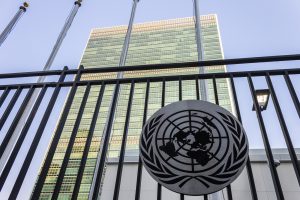On Friday, Russia and China once again wielded their vetoes to forestall the release of a United Nations Security Council (UNSC) resolution expressing its concern over the escalating humanitarian crisis in Myanmar.
The two nations’ delegations reportedly objected to the wording of the statement, which was debated following an in camera session on Myanmar, during which Cambodia’s Foreign Minister Prak Sokhonn, the Association of Southeast Asian Nations (ASEAN)’s special envoy on Myanmar, and his U.N. counterpart Noeleen Heyzer briefed council members on efforts to resolve Myanmar’s crisis.
According to the Associated Press, which obtained a copy of the draft statement authored by the United Kingdom’s delegation, the statement expressed its concern at the violence and serious humanitarian situation in Myanmar, 16 months on from the February 2021 coup that overthrew the government led by Aung San Suu Kyi. It also expressed misgivings about the “limited progress” on the implementation of ASEAN’s Five-Point Consensus peace plan.
The proposed statement stressed the central role of ASEAN “in facilitating a peaceful solution to the crisis” and reiterated council members’ calls to pursue dialogue “with all parties concerned” in the interests of the people of Myanmar, the AP reported.
“However, they expressed concern at the limited progress against the Five-Point Consensus over a year since it was agreed, and called for concrete actions to effectively and fully implement the consensus,” the proposed statement said.
According to other reports, the delegations from the U.K. and China blamed each other for the failure of the day-long negotiations. For the U.K. officials, Beijing was asking for “too much,” which led to the collapse of the negotiations, according to AFP. One of the sticking points for the Chinese delegation was the use of the word “limited” to refer to the progress on ASEAN’s Five-Point Consensus, which it suggested replacing with the word “slow.” A spokeswoman told AFP that China’s proposed wording was “factual but less condescending,” adding that “it’s a real shame” that there was no agreement.
ASEAN’s Five-Point Consensus, agreed at a special meeting of the bloc in April 2021, calls for an immediate cessation of violence and an inclusive political dialogue involving the various parties to Myanmar’s interlocking conflicts. But the plan has received little buy-in from the military junta itself, which has unsurprisingly used the pact to placate regional opinion without taking any meaningful steps toward implementing its terms.
Prior to briefing Friday’s council meeting, ASEAN Special Envoy Prak Sokhonn announced that he would make a second official trip to Myanmar next month. AFP cited unnamed diplomats as saying that the military junta had also approved Heyzer for her first official trip to Myanmar, but that she has not yet received the necessary authorizations. Heyzer was appointed to the post last October.
While the release of a statement of concern by the UNSC would have achieved little, the fact that it stalled over relatively small details indicates the extent of the gap separating the international efforts aimed at resolving Myanmar’s crisis from the situation on the ground. In particular, if the expressions of support for the Five-Point Consensus, which assumes the good faith of the Myanmar military, point to the dearth of workable alternative options for resolving the country’s crisis.

































